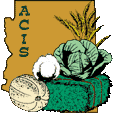
|
|
|
|

|
|||
|
|
|||
|
|
|||
Certain chemicals serve as valuable tools in the continuing effort to minimize crop losses due to plant diseases. For example, active ingredients within fungicides help growers to manage diseases caused by many different plant pathogens. Although often not recognized or appreciated, various substances formed by plants and present before infection help these plants defend themselves against potential plant pathogens. The level of defense can range from various levels of resistance up to outright immunity. Numerous chemical substances are present on the surfaces of plant parts such as leaves, stems, fruit, seeds and roots. Chemicals with antimicrobial properties include phenolic compounds, tannins and fatty-acid like materials. Experiments have shown that some of these compounds have an inhibitory action on certain plant pathogens. For example, toxic exudates on leaves of a specific variety of sugar beet are present at a sufficient concentration to inhibit spore germination of certain fungal pathogens. Another compound in certain types of tomato plants was shown to impart resistance to powdery mildew by inhibiting spore germination. Additionally, proteins and enzymes on plant surfaces can inactivate pathogen enzymes that are essential for disease development. These preformed compounds, together with various types of structural plant disease defenses, often are responsible for what we recognize as resistance to diseases in plants. Even if these plant derived chemical and structural disease defense systems can not totally prevent disease, they together with disease management tools applied by growers contribute to the overall level of disease suppression on a particular crop.

To contact Mike Matheron go to: matheron@ag.arizona.edu.
|
|||
| Back | |||
|
For questions or comments on any of the topics please contact Marco Pena at the Yuma Agricultural Center.
|
|||
|
Home |
Cotton
| Veggies |
Forages
| Grains
| Citrus |
Crop x Crop
Insects | Diseases | Weeds | Pesticides | Economics | News | Weather | Research | Photos | Contacts | General Info. Copyright © 2001 University of Arizona, College of Agriculture and Life Sciences Webmaster: Al Fournier (acis@ag.arizona.edu) |
|||